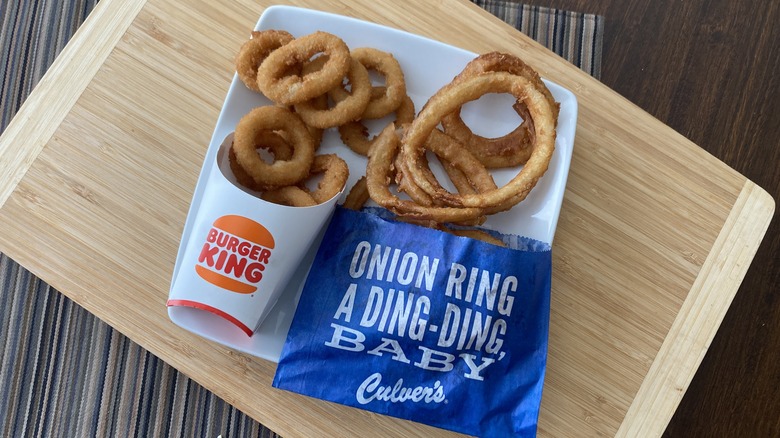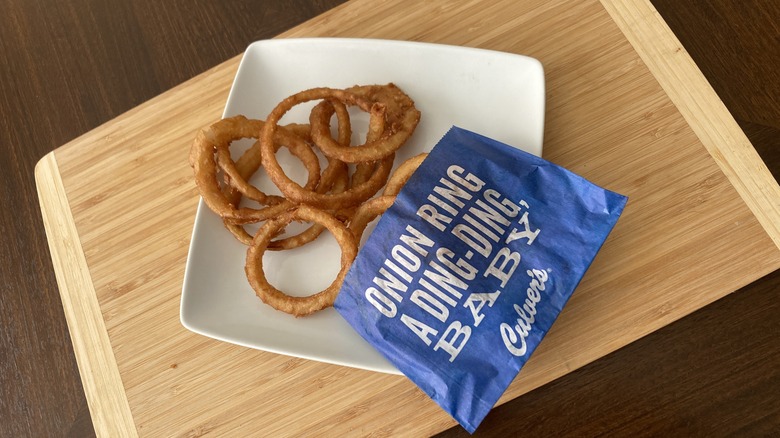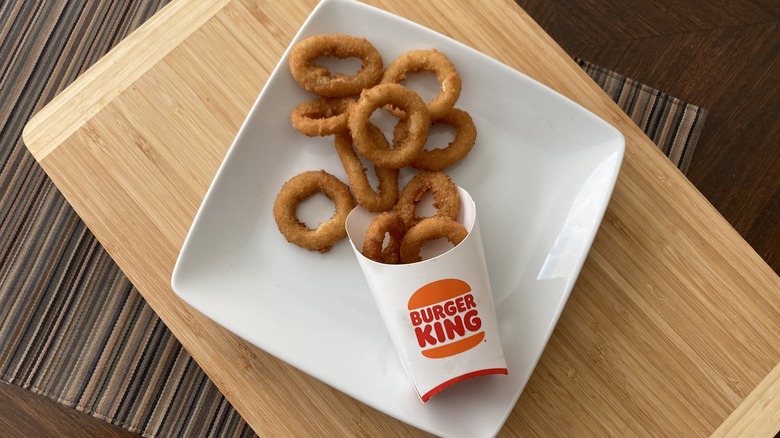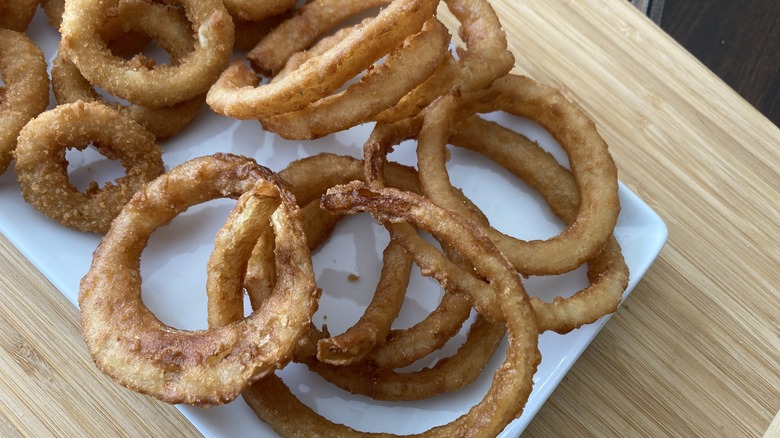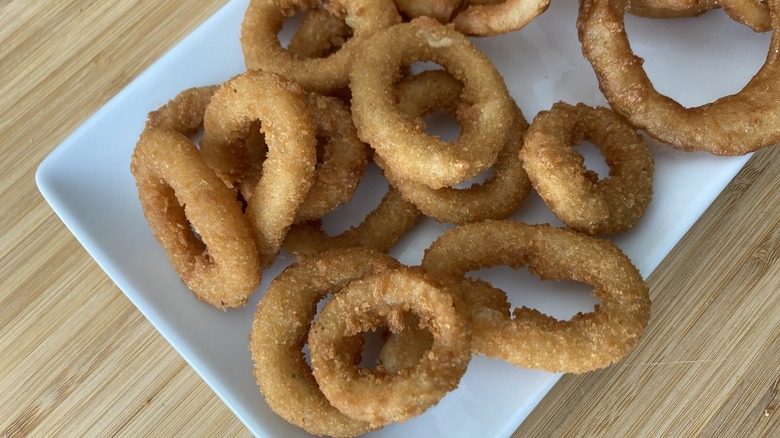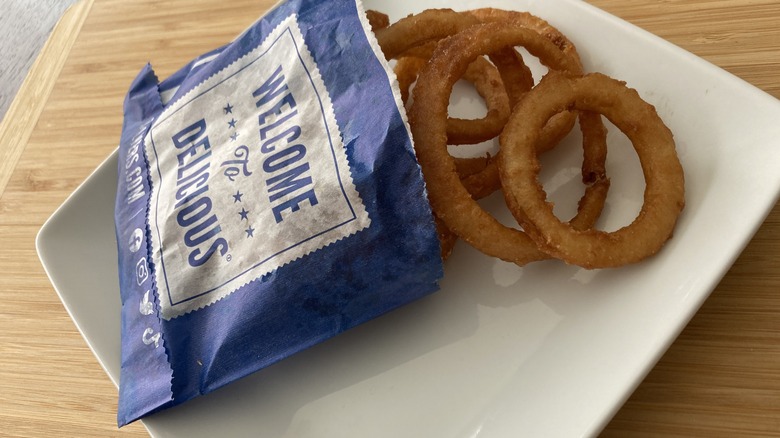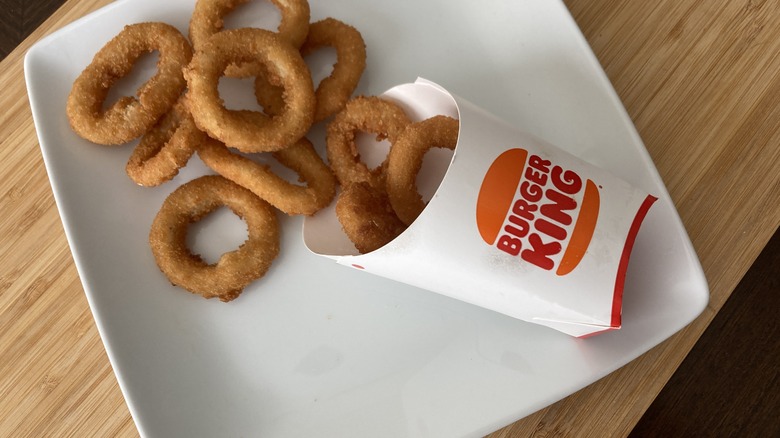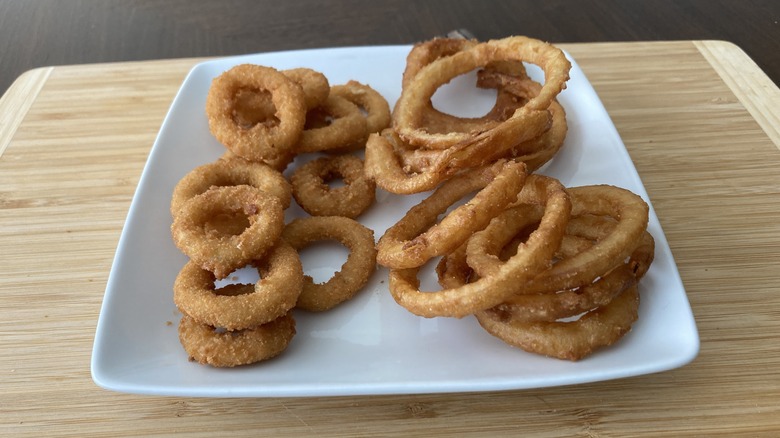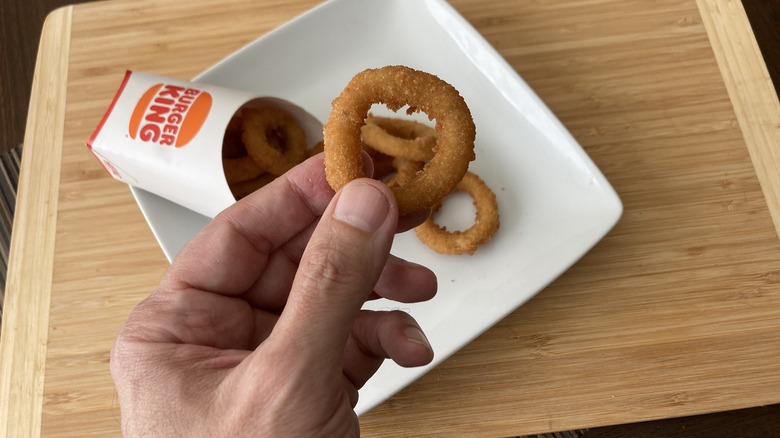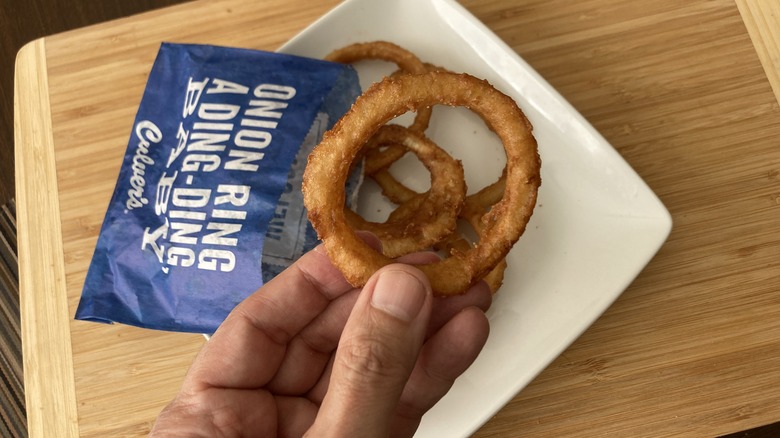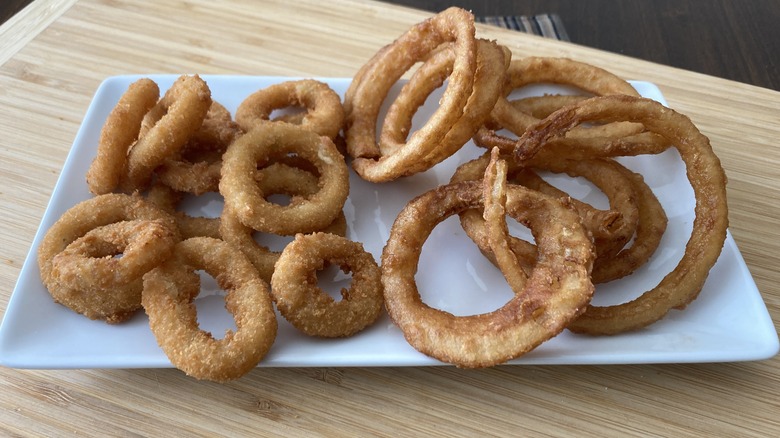Burger King Vs Culver's Onion Rings: Which Is Better?
Onion rings have always been the step-cousin of the fast food world. The more accommodating taste and texture of the classic french fry pushed this crunchy treat aside in favor of an easier-to-eat side dish that doesn't come apart in your hands after the first bite. No matter how far in the background onion rings have been pushed, outlets like Burger King and Culver's have made sure this alternative option stays in the loop. Of course, this means there's a bit of competition between the two chains as they vie for the dining dollars of onion ring lovers who know their options are limited.
Curiosity about whether Burger King or Culver's has the superior onion ring started itching at my brain. Once that happened, it was only a matter of time before I was gliding through the drive-thru and ordering a batch of both to lay side by side to see how these highly delicious hoops measure up against one another. It may surprise you as much as it surprised me to find that there's more than one way to ring an onion, and Burger King and Culver's each has its own approach to the recipe. Each one has its own elements of appeal, but surely one is a more premium pick to throw your dining dollars at. I was determined to get to the truth about Burger King onion rings versus the rings at Culver's, no matter how crunchy the research got.
History
Culver's built its reputation on providing fresher fast food for Midwesterners before spreading beyond the region. The menu featured onion rings made fresh and hot out of the fryer from the jump in 1984, when the company emerged on the scene in Sauk City, Wisconsin. Though the chain became known for its cheese curds, it featured onion rings along with french fries and Butter Burgers, with frozen custard as a standard dessert. The first diners experiencing the chain must have been in fast food heaven.
Burger King has mounted a stunning comeback with its menu of generational favorites, though it hasn't always kept its onion rings in the spotlight. A reconfiguration in the early 2000s shifted the familiar full-onion ring into the pressed-and-fried version customers know today. The company even uses its onion rings to top specialty burgers for a crispy slice of added flavor. Where keeping in touch with the heritage of onion rings as part of the fast food scene, both Burger King and Culver's have honored the legacy of the ring.
Prices and sizes
Not everyone noshes on the same quantity of onion rings, and it helps to have a price and size that accommodates your appetite. If you're rummaging around between your couch cushions for snack money and you come up with a modest sum, Burger King is likely to be your onion ring provider of choice. Thanks to flexibility in sizes and prices, you can order your rings in a value size for $2.49, go for a small for $2.99, opt for the medium for $3.49, or rope in a big batch for $3.99. Leveling up $0.50 per size allows fast foodies of all budgets to enjoy onion rings no matter what their bank balance might be.
On the other end of the pricing spectrum, Culver's jumps into the deep end of the onion ring fryer with a medium order for $3.39, a large for $5.29, and a family-sized bunch for $7.49. There's no small and no value-priced portions, so if you're particularly tight on funds, you might want to check the love seat and lounge chair cushions for coins, too. You'll need them if Culver's is where your onion ring-loving heart lies.
When it comes to prices and sizing, Burger King comes out on top. The chain has a larger variety for customers to choose from.
Nutrition
Onions dipped in batter and tossed in the deep fryer are never going to win accolades for their health benefits. The description alone is likely to cause a nutritionist's nervous system to go all a-jangle. But knowing how much or how little damage you'll do to your nutritional goals is a must, especially when choosing between Burger King and Culver's to get your onion ring fix. Aiming for the middle with a medium order common to both outlets, Burger King's nutrition facts sum up to 360 calories, 16 grams of fat, 5 grams of sugar, and 640 milligrams sodium. Sizing your order up or down will naturally increase or decrease these figures.
For a similar-sized serving at Culver's, you can count on adding 380 calories, 19 grams of fat, 5 grams of sugar, and 460 milligrams of sodium to your dietary diary for the day. There's obviously more to be factored into a larger order, though since Culver's has nothing below a medium on the menu, you'll have to limit your consumption to manually reduce your intake of anything you're looking to avoid.
The numerology behind an order of rings from both restaurants is too close to call. Nutrition is a tie.
Process
If you've never stopped to think about how onion rings are made, it might be easy to imagine there being a single process of slicing onions, pushing out the layers into circles, sloshing them in batter, and frying them until crisp. But anyone who's actually eaten onion rings at more than one establishment knows that there's more than one way to ring an onion. Burger King and Culver's each takes its own distinctive approach to making this crunchy, zesty side dish, an aspect that can be contentious among onion ring fans.
Bite into a Burger King onion ring and you may notice the ring is comprised of a bunch of tiny onion pieces. This is due to the company's use of minced onions pressed into a ring shape rather than an actual onion ring. While this makes it easier to enjoy your rings without the onion slipping loose of its batter sheath, it also raises the question: What is an onion ring if not a ring of onion in its purest form? Culver's adheres to the traditional "a ring is a ring is a ring" method by using whole loops of onion in their most natural state, dipped in beer batter. This provides a more recognizable version of the onion ring model you're likely to find in pubs, bars, and traditional restaurants — or even make yourself if you were industrious enough to give it a try. It may be a matter of taste overall, but it seems Culver's takes the advantage when it comes to process.
Promotions
When your onion rings speak for themselves, you don't have to come up with tricky promotional strategies to get customers to latch on; the food does all the promotional work itself. Burger King's affinity for fries as a preferred side has driven the chain to engage in various promotional approaches to remind its patrons that there's a second option that goes perfectly well with Whoppers and BK Broilers. The company has used everything from Halfsies (half onion rings and half fries) to celebrity endorsements from the likes of NFL superstar Lynn Swann to get its onion rings in the hands and mouths of fast-food diners.
On the other end of the promotional spectrum, Culver's has done more work pushing its famous Butter Burgers than it has reminding the dining public that onion rings are a featured part of the sides menu. Maybe being one of the few restaurants providing fried cheese curds gives Culver's other specialties to promote. Without calling out its own ring thing, the company doesn't do much to make a big deal out of them. Burger King scores over Culver's for its promotional work.
Availability
When you're craving onion rings and nothing else will hit the spot, you want to know you can head somewhere nearby to grab a batch. Burger King understands the power of availability, and though it isn't strictly for its onion ring lovers, the company's more than 6,600 locations around the U.S. make it possible to find what you're hungry for without much travel or trouble. The fact that you sometimes get a stray onion ring in your french fries keeps the crispy treat front-of-mind among its best items, even when you haven't added them to your order.
While Culver's is experiencing an ongoing expansion, the chain still has a restricted location count hovering around the 1,000 mark, making it less likely that onion ring lovers looking for a new favorite can sample the goods on the spur of the moment. But before you let restaurant count take up too much weight in the onion ring sales realm, Culver's sold 9,326,744 orders of onion rings in 2017 alone. As far as availability goes, Burger King and Culver's each pulls its own weight.
Variety of dipping sauces
You're certainly not going to eat your onion rings in their naked state; you're going to need a sauce or two to add zest and zing in whatever your favorite dipping desires dictate. If you're familiar with Burger King's sauces, you may know that there are a stout eight options available, including chili cheese sauce and sweet and sour, a fun switch-up from the usual ketchup and mustard (though those are obviously part of the picture, too). You can even go simple with sour cream or mayonnaise if you like a less kicky dipper.
Culver's aims to impress with its 14-sauce list, which provides alternatives to the usual swipes with marinara, honey mustard, and tartar sauce. There are also several salad dressings and even a cocktail sauce ready to give your onion rings a stroke of upscale magic. With so many choices, you could stock up on sauces and split your rings into categories, like a tasting flight that lets you work out which sauce ramps up the batter-and-onion partnership. It's clear that Culver's has more sauce for making onion rings a special occasion than Burger King does.
Taste Test
There may never have been a study in fast-food contrasts greater than the difference between Burger King and Culver's onion rings. From the moment I pulled each order from its bag, I could tell that there were almost no similarities between the two other than the name and the general idea. Burger King's tiny rings resemble calamari more than actual onion rings, while Culver's oversized ovals look like onion rings through and through. If there's an advantage to the smaller size provided by BK, it's that more rings fit into a medium order, which makes sharing a greater possibility. The cartoonishly large size of Culver's rings means you'll have to break them in half to share them, which may not be a bad thing considering how possessive you are of your fast food sides.
The differences in breading are immediately notable between the two, with Burger King opting for a fine crumb while Culver's goes more for a liquid batter that resembles fried fish. After a few bites of each type of ring, both of which were initially delicious, the difference between the two became strikingly clear. Burger King onion rings taste like any other fried dish you would find on a million drive-thru menus, while Culver's onion rings taste fresh and authentic, unmistakable as classic rings that stand apart from french fries, cheese curds, and any other sort of second-tier option.
Where onion rings are concerned, Culver's dedication to classic freshness elevates its offering into a whole different realm than BK. When it comes to taste, Culver's onion rings are in the winner's circle, while Burger King rings barely make the rounds.
Winner: Culver's onion rings are all-around better than Burger King's
Whether it's thanks to the fresh onions and better batter used or the extended line of sauces provided for dipping or the unending dedication to keeping them on the menu, Culver's onion rings are the superior side dish. This Midwestern maverick of fresher fast food understands the difference made by using real onions, even if each ring ends up being larger than life-sized. It just means you get more to enjoy in every bite, which justifies the higher price while providing an alternative to the usual fast-food joints that don't come through where the rings are concerned.
Kudos to Burger King for keeping its onion rings on the menu after a temporary and unexpected disappearance from certain locations that set fans' hair slightly on fire. While the fast food monarch may not rate next to Culver's in the onion ring Olympics, it still does an admirable job making sure customers have a second choice when fries feel dated. But if you're a connoisseur of the finely fried onion, you have a clear advantage zooming through a Culver's drive-thru or pulling up a seat inside to taste a beer-battered celebration worth dipping into.
How I taste-tested these onion rings
To get the purest experience possible, I opted for no sauce from either chain. Ordering the onion rings was a study in contrasts; Burger King's medium-sized rings come in a tiny bag, even when split into two different cups, while Culver's oversized rings require a full-sized bag. This was my first visual indication that my taste test might be a bit uneven. The aroma of each was distinctive as well, with BK's essence being closer to traditional fries than Culver's, which was closer to fried chicken or fish.
Keeping the tastings separate was key to making sure I could appreciate the nuance of each. The Burger King onion ring was easy to bite into; the mashed nature of the onions inside the battered shell broke apart easily, unlike the Culver's rings, which slipped out of their batter sheath once or twice. Once I'd mastered the proper methods, I tried a total of three rings from each proprietor to make my determination. This left plenty of rings for follow-up tastings, though the decision had been made after the initial samples.
